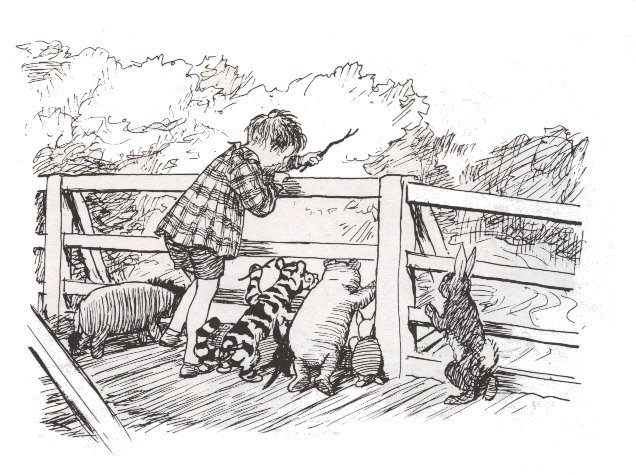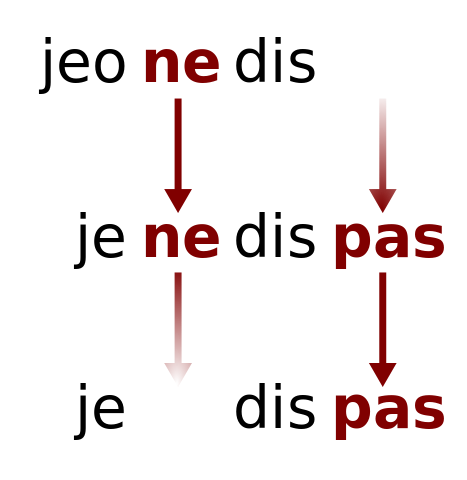
Everyone in the Hundred Acre Wood had gathered at the bridge to watch the game of PoohSticks that Tigger, Pooh, and Eeyore were going to play. There was Much Discussion about who might turn out to be the winner. Pooh, of course, had thought up the game in the first place, and everyone knew he was very good at playing it. And then if you thought about it for a while you realized that if Eeyore was playing, you would remember that he was the winner more often than you thought at first. As for Tigger, he simply had more fun playing PoohSticks than anybody else. In fact Tigger seemed to have more fun at almost everything than anybody else.
As the beginning of the Big Game drew near, Roo got more and more excited. He hopped around looking for sticks and pointed them out to the players. “Here’s a good one, Tigger!” “Look over here, Eeyore!” “Try this one, Pooh!” he kept calling. Then he noticed that Pooh was looking for sticks over near the big oak tree — the one Piglet liked because he found some of the best haycorns underneath it. “Never mind looking there, Pooh,” called Roo, “I didn’t see no sticks over there.”
Kanga didn’t like that one bit. “Roo,” she scolded, “you should say “I didn’t see ANY sticks over there.”
“Ooh, Mama,” said Roo happily, “you didn’t see no sticks there either?”
Poor Kanga was quite vexed by this, but Turtle spoke up helpfully. “Roo,” he said, “what your mother means is that you shouldn’t use two “noes” in one sentence. That’s called a “double negative”.
“Neggle dubbative, neggle dubbative, neggle dubbative!” sang Roo, who Didn’t Care.
“Now just a minute, there,” said Otter, “There are plenty of dialects where a double negative is perfectly acceptable, Turtle.”
“That may be the case,” sniffed Turtle, “but if you consult any authority on grammar, they’ll tell you that ‘two negatives make a positive’, so when Roo says ‘I didn’t see no sticks,’ he’s really saying he did see sticks.”
“I say,” said Owl, “that doesn’t seem to make any sense at all. Everyone knows that’s not what Roo meant.”
“Is ridiculous,” agreed Kodiak. Kodiak was a black bear — Pooh’s cousin — who was visiting from Moscow. Nobody was sure where Moscow was, but Kodiak had assured them it was very far away indeed. “Put more ‘noes’ together mean especially ‘no’. Nobody doesn’t know this,” he said.
“You’ll find,” said Turtle, “that using double negatives in our dialect, at this time, is Frowned Upon. It is simply incorrect. It might be acceptable in other places, and at other times, but not here.”
“Other places and other times are right,” grumbled Kodiak. “Is same as saying ‘very very very much’ but with noes.”
“What you’re talking about, Turtle, is Jesperson’s Cycle,” said Otter. “It’s a recognition that the historical development of expressing negation in languages follows a common process. Languages start with a simple marker of negation placed before the verb, then develop discontinuous markers before and after the verb, and proceed in many cases to only a marker following the verb. In many languages the second and third stages of the cycle repeat periodically. Stage two, of course, is where the double negative occurs. It’s quite commonly known in historical linguistics, you see.”
“Mama, what’s dis…discon…discontimminus?” asked Roo, tugging at Kanga’s apron.
“Is when one thing doesn’t not follow the other,” said Kodiak helpfully. “Like when Roo visits Otter and Tigger goes to see Rabbit.”
“Oh dear,” said Rabbit, who didn’t at all like being Bounced by Tigger.
“Well it is true,” admitted Turtle, “that in Old English if you said ‘ic secge’ it meant ‘I say,’ and if you wanted to say ‘I don’t say’ you could say ‘ic ne secge noht’.” And in Middle English, for a while, you would always use both negatives.”
“But I say,” said Owl, “what we’re speaking now is modern English, I’ll wager. Although we do seem to be near the middle of the Hundred Acre Wood…”
“And that oak tree must be very old,” added Rabbit, who hadn’t been listening very closely, “just look at how tall it’s grown.”
Just then they all looked over to the bridge, where Tigger had just whooped that his stick had won the first round of PoohSticks.
“Don’t worry, Eeyore! Don’t worry, Pooh!” called Roo. “That’s just the first one; it doesn’t mean you won’t win the next one!”
Kanga was still trying to decide whether or not Roo deserved a scolding when Otter summed it up.
“Well there you are,” said Otter. “Discontimminus indeed!”

Jesperson’s Cycle in a French example. By Ajmint – Own work, CC BY-SA 4.0
